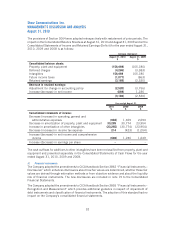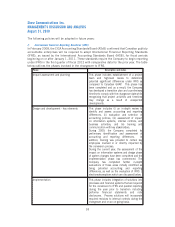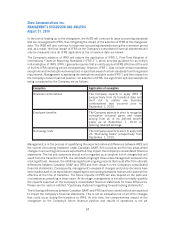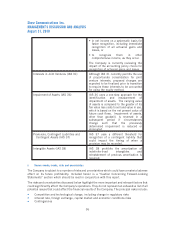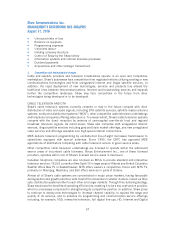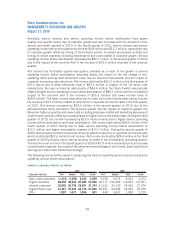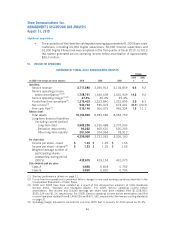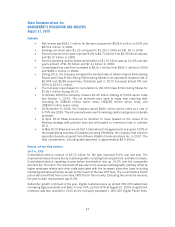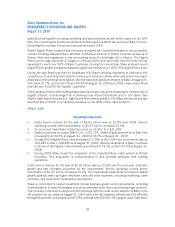Shaw 2010 Annual Report Download - page 46
Download and view the complete annual report
Please find page 46 of the 2010 Shaw annual report below. You can navigate through the pages in the report by either clicking on the pages listed below, or by using the keyword search tool below to find specific information within the annual report.iv) Uninsured risks of loss
The Company presently relies on two satellites (Anik F2 and Anik F1R) owned by Telesat Canada
(“Telesat”) to conduct its DTH and Satellite Services business. The Company owns certain
transponders on the Anik F2 and has long-term capacity service agreements in place in respect
of transponders on both Anik F1R and Anik F2. As the satellite owner, Telesat maintains insurance
policies on each satellite while Shaw funds a portion of the insurance cost such that in the event
Telesat recovers insurance proceeds in connection with an insured loss, Shaw will be entitled to
receive certain compensation payments from Telesat. The Company expects that Telesat will renew
the insurance policies in respect of both satellites and that Shaw will continue to contribute to the
cost of these policies while they are in effect.
The Company does not maintain business interruption insurance covering damage or loss to one or
more of the satellites used in its DTH and Satellite Services business as it believes the premium
costs are uneconomic relative to the risk of satellite failure. Transponder capacity is available to the
Company on an unprotected, non-preemptible service level basis, in both the case of the Anik F2
transponders that are owned by Shaw and the Anik F1R and Anik F2 transponders that are secured
through service capacity agreements. The Company has priority access to spare transponders on
each satellite in the case of interruption, although there is no assurance that such transponders
would be available. In the event of satellite failure, service will only be restored as additional
capacity becomes available. Restoration of satellite service on another satellite may require
repositioning or re-pointing of customers’ receiving dishes. As a result, the customers’ level of
service may be diminished or they may require a larger dish. Satellite failure could cause customers
to deactivate their DTH subscriptions or otherwise have a material adverse effect on business and
results of operations.
Network failures caused by damage by fire, natural disaster, power loss, hacking, computer viruses,
disabling devices, acts of war or terrorism and other events could have a material adverse affect on
the business, including customer relationships and operating results. The Company protects its
network through a number of measures including physical security, ongoing maintenance and
placement of insurance on its network equipment and data centers. The Company self-insures the
plant in the cable and Internet distribution system as the cost of insurance is generally prohibitive.
The risk of loss is mitigated as most of the cable plant is located underground. In addition, it is likely
that damages caused by any one incident would be limited to a localized geographic area and
therefore resulting business interruption and financial damages would be limited. Further, the
Company has back-up disaster recovery plans in the event of plant failure and redundant capacity
with respect to certain portions of the system. In the past, it has successfully recovered from
damages caused by natural disasters without significant cost or disruption of service. Although the
Company has taken steps to reduce this risk, there can be no assurance that major disruptions will
not occur.
v) Reliance on suppliers
Shaw’s distribution and call center network is connected or relies on other telecommunication
carriers and certain utility companies. Any of the events described in the preceding paragraph, as
well as labour strikes and other work disruptions, bankruptcies, technical difficulties or other events
affecting these carriers or utilities could also hurt business, including customer relationships and
operating results.
The Company sources its customer premise and capital equipment and capital builds from certain
key suppliers. While the Company has alternate sources for most of its purchases, the loss of a key
supplier could adversely affect the Company in the short term.
42
Shaw Communications Inc.
MANAGEMENT’S DISCUSSION AND ANALYSIS
August 31, 2010


